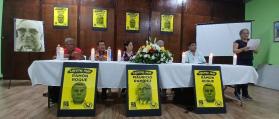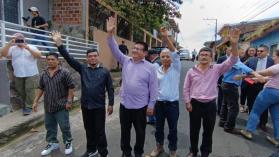Bukele's 2020 Budget Proposal Increases Defense, Cuts Social Programs, 'Does Not Correspond to Needs of Country'
The Bukele administration recently released its 2020 budget proposal, putting into concrete terms what the president meant by “bitter medicine” in his inauguration address: in short, large cuts to social welfare initiatives, public programs, and state institutions. Although the social movement saw this coming and sounded the alarm about the likelihood of a sweeping business-friendly austerity agenda months before the election, the details are grim. According to social movement statements that have come out in the wake of the proposal, the budget represents a reorientation of priorities that "no longer correspond to the needs of the country."
Overview*
The largest budget increases go to the Ministries of Defense (26.7%), Government (15.1%, which includes $22.5 million for “advertising”), Health (12.4%), and Security (11.1%). Regarding defense, the 2020 proposal represents the first time in many years that spending in this area has increased. Further, the defense increase alone represents more than the total 2020 budgets of either the Ministry of Environment or the Ministry of Culture. The increase for the Ministry of Health is regarded as a positive step by the social movement; however, much of the increase represents loan disbursements (approved by the previous administration) and salary increases. Additionally, the primary care budget, which includes community health centers, such as the “ECOS”—11 of which have already been closed, and Ciudad Mujer (which would see a -15% decrease) is actually reduced overall by -25%, signifying a large step backward from the progressive preventative approach to healthcare established by the previous FMLN administrations.
A marginal budget increase of 3.8% (vs 6% in 2019) would go to the Ministry of Education, and approximately half of that is likewise allocated to salaries. The budget for the University of El Salvador (UES), which in 2019 was increased by 15.5%, in 2020 would see 0% increase (except in salaries). Authorities at the UES say that the budget is not sufficient for the needs facing the university, which is the only public institution of higher education in the country. Additionally, funds for literacy, teacher training, promotion of full-time inclusive school, youth programs, and other educational support programs have been suppressed or the programs eliminated altogether (which is the case for the literacy initiative).
Significant budget decreases would be seen in institutions linked to economic and social services: The Ministry of Environment and Natural Resources (MARN) would see a decrease of -20.5%; Agriculture would decrease -5% (including a reduction in the family agriculture plan [PAF] and the agricultural package program); and Economy -10% (due especially to a -12.6% reduction of the gas subsidy). The budget for the hydroelectric commission (CEL) would decrease -4.6%; the national water and sanitation administration (ANDA) by -5.1%; electricity and telecommunications (SIGET) by -11.8%; and the national commission of small and microbusiness (CONAMYPE) by -8.5%. The already strained universal basic pension would be reduced by -10.3%.
Taken together, the budget proposal confirms the social movement’s warning that the administration is intent on weakening state institutions and opening the country to private investment at the expense of El Salvador’s poorest and most vulnerable communities. As has been seen repeatedly in austerity environments, as defunded public programs fail or fall into bankruptcy, the services they offer are sold off to private investment, which in turn leads to deregulation and an increase in consumer prices that are felt most deeply by the poor. And without social programs to at least marginally offset the effects of privatization, poverty deepens. A statement from the civil society organization PROES (Professionals for the Transformation of El Salvador) shows that between 2008-2018, poverty decreased from 40% to 26% because of successful healthcare reforms and approval of the Law of Development and Social Protection of El Salvador, which ushered in 14 different social programs. If the proposed cuts are approved, PROES warns, “thousands of families would fall back into poverty.” Further, it argues, the budget would violate the human rights of the Salvadoran population as it "affects the sectors with less resources and significantly reduces social investment."
The feminist movement likewise has denounced the cuts to women’s programs as dangerously regressive. The 2020 proposal, in addition to the decrease in Ciudad Mujer funding also calls for a $1.6 million decrease in the Violence Against Women initiative. In a country that experiences hundreds of feminicides a year, not to mention extremely high rates of rape and other forms of gendered violence, proposed reductions in the few protective measures that exist have driven women to the streets in protest. The budget proposal would have a disproportionate negative effect on women in other areas as well, given that it represents the disappearance of “$80 million worth of programs aimed mainly at women such as gas subsidies, universal basic pension, education and health programs, family and rural agriculture assistance, and sexual and reproductive education.”
These cuts would also come amid a wave of recent murders of LGBTI persons, to which the current government has yet to respond. In the wider context of a now virtually nonexistent agency to serve the LGBTI population after the dissolution of the Social Inclusion Secretariat earlier this year, the fact the the 2020 budget does not earmark any funds for sexual diversity or LGBTI inclusion is alarming.
The cuts to the environmental budget are also extremely worrying. The Central American region is at the forefront of the climate change crisis. Droughts and floods throughout Guatemala, El Salvador, and Honduras are pushing small farmers from their land, often forcing them to migrate. Further, the agencies with the deepest reductions are environmental sanitation, water security, and environmental assessment and compliance, the last of which is responsible for regulating environmental permits and enforcing environmental standards. The Bukele administration has already pushed through permits for large capitalist projects by bypassing research on environmental impacts, and cuts to environmental oversight will only ensure this process increases.
The fact that these cuts come alongside a more than 26% increase in defense spending and an 11% increase in Security creates an even bleaker outlook. Bukele’s anti-gang “Territorial Control Plan” has already deployed soldiers throughout the country. And more recently his administration has placed troops, police, and immigration officials at the El Salvador/Guatemala border in an effort to deter migrants—a concession to US pressure and a clear violation of international law. It is truly frightening to consider what this picture would look like fueled by millions more dollars in funding.
In sum, the reversal in priorities represented by the 2020 budget—from the social welfare initiatives of the previous administration in support of the most vulnerable to a militarized investment environment for national and transnational corporations—is exactly the sort of neoliberal imposition that has triggered the massive waves of uprising across Latin America. PROES warns that “the dismantling of the social protection system, which the current government has already begun and which would continue with the 2020 budget, could generate a climate of social instability.”
The budget has not yet been approved. The social movement has requested that the Finance and Special Budget Commission hear the complaints and proposals from civic society and social movement organizations and reallocate funds that do not correspond to the needs of the country toward other items that guarantee the people’s rights. They argue that “fiscal policy is a tool that must be used to guarantee rights and correct inequities generated by the exclusionary economic system,” and call for fiscal reform that “arises from a political discussion . . .and includes real participation of the peasant movement, women, youth, artists, professionals, trade unions, native peoples and other organized social sectors that are necessary to build a popular democracy.”
*Data from PROES, Cuadernos de Análisis, No 02, Noviembre 2019. “Proyecto de Presupuesto 2020 Violenta Derechos Humanos” and “Por un Presupuesto Público que Garantice Derechos, Posicion de movimientos y organizaciones sociales frente el Proyecto de Presupuesto 2020”

 "I am a CISPES supporter because continuing to fight for social justice and a more people-centered country means continuing the dream and sacrifice of thousands of my fellow Salvadorans who died for that vision.” - Padre Carlos, New York City
"I am a CISPES supporter because continuing to fight for social justice and a more people-centered country means continuing the dream and sacrifice of thousands of my fellow Salvadorans who died for that vision.” - Padre Carlos, New York City

